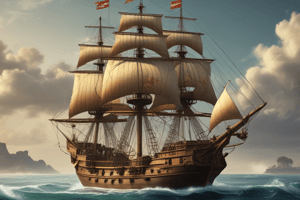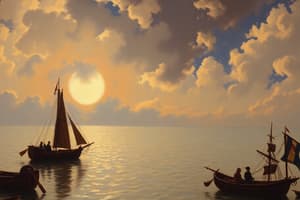Podcast
Questions and Answers
¿Cuándo comenzó la exploración y conquista de América por parte de los españoles?
¿Cuándo comenzó la exploración y conquista de América por parte de los españoles?
- 1492 (correct)
- 1550
- 1521
- 1511
¿Qué nombres recibieron las islas en las que Cristóbal Colón desembarcó durante su primer viaje?
¿Qué nombres recibieron las islas en las que Cristóbal Colón desembarcó durante su primer viaje?
- Nueva España
- San Juan
- San Salvador (correct)
- Santa Cruz
¿Qué motivó principalmente a los españoles a llegar a América en 1511?
¿Qué motivó principalmente a los españoles a llegar a América en 1511?
- Búsqueda de especias y seda
- Establecer rutas comerciales con África
- Conquistar territorios para la corona portuguesa
- Búsqueda de oro, perlas y otras riquezas (correct)
¿Cuál fue el nombre de las tres naves en las que Cristóbal Colón partió en su primer viaje?
¿Cuál fue el nombre de las tres naves en las que Cristóbal Colón partió en su primer viaje?
¿Quiénes aprobaron una ley en 1511 que otorgaba derechos exclusivos a la corona española para colonizar las tierras recién descubiertas?
¿Quiénes aprobaron una ley en 1511 que otorgaba derechos exclusivos a la corona española para colonizar las tierras recién descubiertas?
¿Qué consecuencia tuvo la llegada de los españoles a América en la población indígena?
¿Qué consecuencia tuvo la llegada de los españoles a América en la población indígena?
¿Qué impacto tuvo la introducción del cristianismo por parte de los españoles en los pueblos nativos?
¿Qué impacto tuvo la introducción del cristianismo por parte de los españoles en los pueblos nativos?
¿Qué método utilizaron los conquistadores españoles para someter a las poblaciones indígenas?
¿Qué método utilizaron los conquistadores españoles para someter a las poblaciones indígenas?
¿Qué factor motivó a los españoles a explorar y colonizar América según el texto?
¿Qué factor motivó a los españoles a explorar y colonizar América según el texto?
¿Cuál fue una consecuencia duradera de la colonización española en América según el texto?
¿Cuál fue una consecuencia duradera de la colonización española en América según el texto?
Flashcards are hidden until you start studying
Study Notes
Arrival of Spanish in America
The Spanish exploration and conquest of the Americas began with Christopher Columbus's first voyage to the New World in 1492 when he landed on the island of Guanahaní, which is now known as Cuba. This marked the start of the European colonization of the Americas. However, it was over two decades later that Spain officially claimed possession of lands newly discovered by Europeans. In 1511, Ferdinand II of Aragon and Isabella I of Castile approved a law that granted the Spanish crown exclusive rights to colonize the newly discovered lands.
Columbus's First Journey
Christopher Columbus, an Italian explorer sailing under the Spanish flag, set out on his first voyage in 1492 with three ships: the Santa Maria, the Pinta, and the Nina. His journey was primarily sponsored by the Spanish monarchs, Isabella I of Castile and Ferdinand II of Aragon, with additional support from Italian merchants. Columbus was searching for a western route to Asia, but he landed on the islands of the present-day Bahamas in the Caribbean Sea. He named the islands "San Salvador," which means "Holy Savior".
Arrival of the Spanish in the Americas
The Spanish officially arrived in the Americas in 1511. The Spanish were driven by a variety of factors, including the desire for gold, pearls, and other precious resources, as well as the search for a western sea route to Asia and their desire to spread Christianity. The first Spanish colony was established in the Caribbean, and it was not until 1518 that the first permanent settlement was founded in Mexico.
The Significance of Spanish Arrival
The arrival of the Spanish in America had significant consequences for the inhabitants of the continent. The Spanish brought with them diseases to which the native peoples had no immunity, causing the deaths of millions. The Spanish also introduced Christianity, which had a profound impact on the native peoples' religious beliefs and practices. The Spanish conquest and colonization also led to the establishment of a system of labor based on enslaving indigenous people and later enslaving Africans, which had long-lasting effects on the continent's demographics.
Spanish Exploration and Conquest
The Spanish exploration and conquest of the Americas were marked by a series of expeditions and battles. The Spanish explorers and conquistadors, such as Hernán Cortés, Francisco Pizarro, and Gonzalo Jiménez de Quesada, led expeditions that conquered vast territories in the Americas. These conquistadors used a combination of military force, alliances with indigenous peoples, and the spread of disease to subdue the native populations. The Spanish continued to explore and conquer new territories in the Americas for centuries, eventually establishing a vast empire that stretched from Florida to California and from Texas to Peru.
In conclusion, the arrival of the Spanish in America marked the beginning of European colonization of the Americas. The Spanish were driven by a variety of factors, including the desire for gold, pearls, and other resources, the search for a western sea route to Asia, and the spread of Christianity. The Spanish conquest and colonization had significant consequences for the inhabitants of the continent, including the introduction of diseases, the spread of Christianity, and the establishment of a system of labor based on enslavement.
Studying That Suits You
Use AI to generate personalized quizzes and flashcards to suit your learning preferences.




